时态第二讲
英语时态8种基本时态讲解.ppt课件

8.过去完成时 表示动作发生在过去某一时间之前已经完成的动作或状态, 强调“过去的过去”, 常与 by the time, by the end of…,before , by 等引导时间的状语连用。
基本结构 主语+ had + 动词过去分词 + 其他成分 When I got to the cinema yesterday the film had begun already. He had learned English before he came here.
现在完成时与一般过去时的区别: 1)现在完成时侧重于对现在的影响;而一般过去时侧重于某一动作发生在过去某个时间或某段时间。即现在完成时侧重于现在的结果,而一般过去时侧重于动作发生的时间。例如:
I have seen the film. 我看过这部电影。(现在我仍记得电影的内容) I saw the film three days ago. 三天前我看了这部电影。(强调是三天前,而不是别的什么时候看的电影)
be going to含有“打算,准备”的意思,而will则没有这个意思, She is going to lend us her book. He will be here in half an hour.
be about to+V.原形(意为马上做某事,在时间上指最近的将来) I am about to leave school. 不能与表示时间的副词连用。 They are about to set out.(√) They are about to set,变y为i加-ed. study----studied carry----carried cry----cried try----tried d)以元音字母+y结尾的单词直接加-ed. play----played stay----stayed
【专项复习】小升初英语课件-核心考点 题型专项突破:专题 04 时态 第二讲 现在进行时 全国通用版

考点四 现在进行时特殊用法
用进行时表将来时。这样的动词有arrive, come, get, go, leave, start等。 We are leaving on Friday.我们星期五出发。 He is arriving tomorrow morning. 他明天早上到。 Christmas is coming. 圣诞节要到了。
The court is hearing evidence this afternoon.法庭今天下午听取证词。
考点四 现在进行时特殊用法
②表示态度、感情、心理状态和继续等意思的动词: 如:like(喜欢),love(爱),know (知道), want (需要),hope (希望),hate (恨), think (认为),agree (同意), believe (相信)等, e.g. ___I__li_k_e_d_o_g_s._____ 我喜欢狗。
思路点拨:考查实义动词的单数第三人称形式.句意"汤姆总是穿着黑色的鞋子,但今天他穿 着白色的鞋子"根据题干Tom alwaysblack shoes,这里强调的是穿着的状态,主语是Tom,即汤姆 总是穿着黑色的鞋子,所以用wears;but today hewhite shoes.这里强调现在他穿着,所以用is wearing.故选C.
__I__a_m__s_i_n_g_i_n_g_.________ 我正在唱歌。 __T__h_e_y__a_r_e_w__r_it_i_n_g_____ 他们正在写作。
(2)否定式:主语+be(am/is /are)+not+doing+其他。
____I__a_m__n_o_t__si_n_g_i_n_g_________ .我没在唱歌。 ____T__h_e_y_a_r_e_n__'t_w__r_i_ti_n_g_._______ 他们没有在写作。
英语专项 语法 时态 14 条件句之第二条件 讲解+练习+答案 second conditional
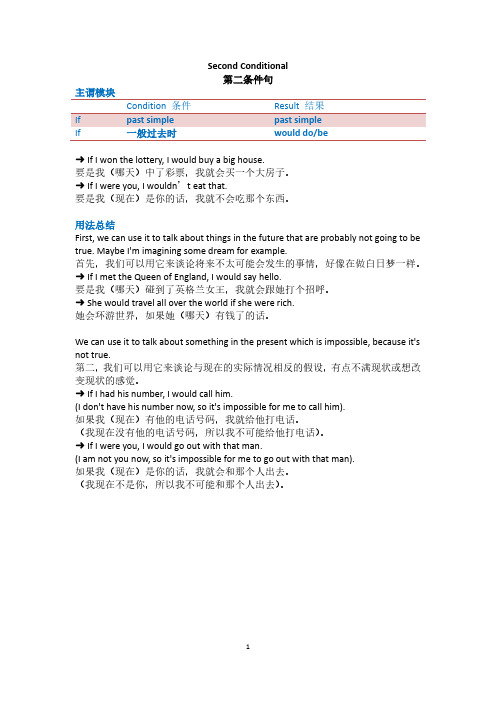
Second Conditional第二条件句主谓模块➜ If I won the lottery, I would buy a big house.要是我(哪天)中了彩票,我就会买一个大房子。
➜ If I were you, I wouldn’t eat that.要是我(现在)是你的话,我就不会吃那个东西。
用法总结First, we can use it to talk about things in the future that are probably not going to be true. Maybe I'm imagining some dream for example.首先,我们可以用它来谈论将来不太可能会发生的事情,好像在做白日梦一样。
➜ If I met the Queen of England, I would say hello.要是我(哪天)碰到了英格兰女王,我就会跟她打个招呼。
➜ She would travel all over the world if she were rich.她会环游世界,如果她(哪天)有钱了的话。
We can use it to talk about something in the present which is impossible, because it's not true.第二,我们可以用它来谈论与现在的实际情况相反的假设,有点不满现状或想改变现状的感觉。
➜ If I had his number, I would call him.(I don't have his number now, so it's impossible for me to call him).如果我(现在)有他的电话号码,我就给他打电话。
(我现在没有他的电话号码,所以我不可能给他打电话)。
➜ If I were you, I would go out with that man.(I am not you now, so it's impossible for me to go out with that man).如果我(现在)是你的话,我就会和那个人出去。
译林版][初一上英语Unit2]第二讲Letx27splaysports语法篇(含答案)
![译林版][初一上英语Unit2]第二讲Letx27splaysports语法篇(含答案)](https://img.taocdn.com/s3/m/74a8c5330508763230121219.png)
1第 2 讲 Let ' s play sports!学习目标Brain twister What letter is an ani mal? What letter is a part of head?般现在时 当主语是三单,I 肯定句:主语+动词三单形式+其它1. 学会用英语表达体育运动2. 能够学会在一般现在时态中变化人称单复数3. 能够正确使用一般疑问句4. 学会元音音标发音 What letter is a vegetable? (PEA) (BEE) (EYE)动词变相应的 三单形式。
一 否定句:主语+doesn'+动词原形+其它 一般疑冋句:Does+主语+动词原形+其匕 肯疋句:主语+动词原形+其匕 当主语不是第. 三人称单数时 否定句:主语+don't+动词原形+其它 一般疑冋句:Do+主语+动词原形+其匕We use the simple present tens whe n we talk about:We make positive and n egative senten ces using the verb to do in the simple prese nt tense like this:l/You/We/They likesports..冋曲、沖、 邹:电2精牆练★ do not = don ' t Cah eat Hsh + Millie gets up at 6:30 every morning. Simon likes playing football.thin^ that are true now things that we often do things that arc always truenot = doesn ' tl/You/We/They do notlike sports.He/She/*t does notWe ask and an swer questi ons using the veito do in the simple prese nt tense like this:Do l/you/we/theylike sports?Does he/she/it★ we don' t us do/dose to form questi ons whe n the main verb of the sentence is to be.She is a student. f Is she a student?Remember that we add -s to the verb after he, she or it. However, there are some exceptio ns:Most verbs+ 5like likes play playsVerbs ending tn a conso+ y-y -b ies study studies fly filesVerbs ending tn sh, ss or x+ es watchdresswatchesdresseswashfixwashesfixesdoesl/yot/you/we/they he/she/it do not does not3Some verbs ending in o+ es go goes do does ★ We cha nge have to has whe n it comes after he, she or it.I have a ball. f She has a ball.注释:(1)一般情况下,直接力卩-s,如:bag-bags, cat-cats, pan da-pa ndas, mon key-monkeys, horse-horses(2)以s, x, o, ch, sh, z 结尾的,力卩-es,如:bus-buses, box-boxes, brush-brushes,watch-watches(3)以辅音字母+y结尾的,变y为i+es.如:study-studies.[述LET% EXPLORE ]Millie is writ ing about herself and classmates. Help her complete the sen ten ces withthe correct forms of the verbs in the box.dance go like play watch1. I _________ playing volleyball.2. Kitty _________ very well.453. Amy _________ swimming every week.4. Sim on ofte n ________ football with his friends.5. Daniel sometimes _________ ball games on TVThe students are writing their names under the activities they like in the table below. Complete the questi ons and the n use the in formatio n to an swer them. 1. __ Do ___ Sandy and Kitty enjoy listening to music? _Yes, they do 2. ________ Millie like swimming? ____________ 3. ________ Amy enjoy reading? ____________ 4. ________ Sim on like walki ng? ____________ 5. ________ Sim on and Dani el love drawi ng? ____________ Kitt# Sandy HAVE A TRY Listening to music Swimming Reading Walking Drawing Pt mid rvwi# Wife SandyPulllit Kittif ddnc^Daniel and Sim on are talki ng about their weeke nds. Complete their conv ersati onwith the correct forms of the verbs in brackets.Daniel: Hi. Sitnoir u________________ you____________ (play) football at weekends?Simon: Of course* I often ______________(|>hy> f<K)tball with my cousins.Daniel: " _____________ your parents_____________ (go} with you?Simon: No, they don't. But my dad sometimes 1" (ivatch) ourgiitncs. Sometimes he 内__________________________ (read) at tiomc. My mum oftenm _________ r(shop) at weekends. What abvut you, l^niel?Daniek T often " _ {stay} at home. Sometimes I 他____________________________ 仗o)演练方阵swimming with my dad R一、填空1. We often ___ (play) in the playgo und.2. He ___ (get) up at six o ' clock.3. ___ you _____ (brush) your teeth every morni ng.4. What (do) ____ he usually (do) _____ after school?5. Da nny ___ (study) En glish,Chi nese,Maths,Scie nee and Art an school.6. Mike sometimes ______ (go) to the park with his sister.7. At eight at ni ght,she ________ (watch) TV with his pare nts.8. _____ Mike ________ (read) En glish every day?9. How many lessons _______ y our classmate _______ (have) on Mon day?lO.What time ________ his mother ________ (do) the housework?6二、改句子1. Do you ofte n play football after school?(肯定回答)2.1 have many books.(改为否定句)3. Gao Shan ' s sister likes playing table tennis改为否定句)4.She lives in a small tow n near New York.(改为一般疑问句)5.1 watch TV every day.(改为一般疑问句)6. David has got a goal.(改为一般疑问句)7. We have four less on s.(否定句)8. Nancy doesn ' t run fast肯定句)9. My dog runs fast.(否定句)10. Mike has two letters for him.一般疑问句:否定句:11.1 u sually play football on Friday after noon.否定句:一般疑问句:12.Su Yang usually washes some clothes on Saturday.否定句:7一般疑问句:13. Mingming usually waters the flowers every day否定句:般疑问句:14. Tom does his homework at home.否定句:一般疑问句:三、写出下列动词的第三人称单数形式:1. wash ________ match _______ guess ____ study _____ finish ________go ______ snow _____ carry _________2. stop ______ s ee _______ drive _______ let ______ catch ______ keep _____join ______ f ind ______ think ________ teach ______ d o _____3. stay ______ b egin ______ forget _______ draws _____ lie _______ die _______run ______ prefer _____ give _______ ring _______ d ance _____ hope _______四、翻译1. 他在第三小学上学。
英语主谓宾时态用法
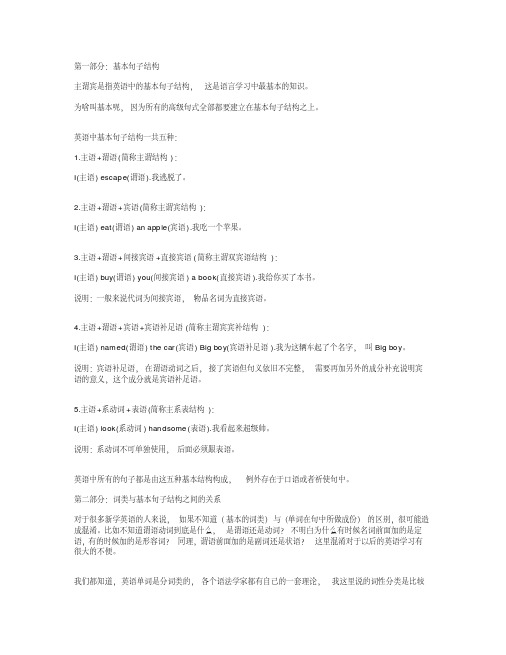
第一部分:基本句子结构主谓宾是指英语中的基本句子结构,这是语言学习中最基本的知识。
为啥叫基本呢,因为所有的高级句式全部都要建立在基本句子结构之上。
英语中基本句子结构一共五种:1.主语+谓语(简称主谓结构):I(主语)escape(谓语).我逃脱了。
2.主语+谓语+宾语(简称主谓宾结构):I(主语)eat(谓语)an apple(宾语).我吃一个苹果。
3.主语+谓语+间接宾语+直接宾语(简称主谓双宾语结构):I(主语)buy(谓语)you(间接宾语)a book(直接宾语).我给你买了本书。
说明:一般来说代词为间接宾语,物品名词为直接宾语。
4.主语+谓语+宾语+宾语补足语(简称主谓宾宾补结构):I(主语)named(谓语)t he car(宾语)Big boy(宾语补足语).我为这辆车起了个名字,叫Big boy。
说明:宾语补足语,在谓语动词之后,接了宾语但句义依旧不完整,需要再加另外的成分补充说明宾语的意义,这个成分就是宾语补足语。
5.主语+系动词+表语(简称主系表结构):I(主语)look(系动词)handsome(表语).我看起来超级帅。
说明:系动词不可单独使用,后面必须跟表语。
英语中所有的句子都是由这五种基本结构构成,例外存在于口语或者祈使句中。
第二部分:词类与基本句子结构之间的关系对于很多新学英语的人来说,如果不知道(基本的词类)与(单词在句中所做成份)的区别,很可能造成混淆。
比如不知道谓语动词到底是什么,是谓语还是动词?不明白为什么有时候名词前面加的是定语,有的时候加的是形容词?同理,谓语前面加的是副词还是状语?这里混淆对于以后的英语学习有很大的不便。
我们都知道,英语单词是分词类的,各个语法学家都有自己的一套理论,我这里说的词性分类是比较好理解的一种英语中词类分为以下几种:动词,名词,形容词,副词,冠词,介词,数词,代词,连词,感叹词。
英语中的构成句子的语法成份有以下几种:主语,谓语,宾语,定语,状语,补足语,表语,同位语。
时态的讲解
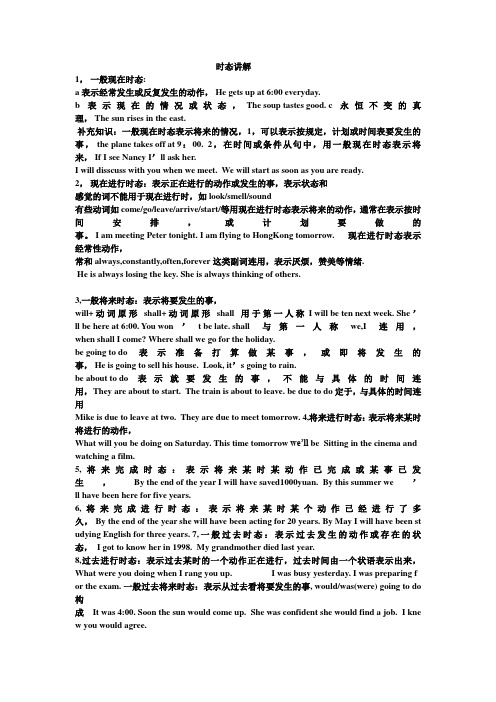
时态讲解1,一般现在时态:a 表示经常发生或反复发生的动作, He gets up at 6:00 everyday.b 表示现在的情况或状态,The soup tastes good.c 永恒不变的真理, The sun rises in the east.补充知识:一般现在时态表示将来的情况,1,可以表示按规定,计划或时间表要发生的事, the plane takes off at 9:00. 2,在时间或条件从句中,用一般现在时态表示将来, If I see Nancy I’ll ask her.I will disscuss with you when we meet. We will start as soon as you are ready.2,现在进行时态:表示正在进行的动作或发生的事,表示状态和感觉的词不能用于现在进行时,如look/smell/sound有些动词如come/go/leave/arrive/start/等用现在进行时态表示将来的动作,通常在表示按时间安排,或计划要做的事。
I am meeting Peter tonight. I am flying to HongKong tomorrow. 现在进行时态表示经常性动作,常和always,constantly,often,forever这类副词连用,表示厌烦,赞美等情绪.He is always losing the key. She is always thinking of others.3,一般将来时态:表示将要发生的事,will+动词原形 shall+动词原形 shall用于第一人称 I will be ten next week. She’ll be here at 6:00. Y ou won’t be late. shall与第一人称we,I连用,when shall I come? Where shall we go for the holiday.be going to do 表示准备打算做某事,或即将发生的事, He is going to sell his house. Look, it’s going to rain.be about to do 表示就要发生的事,不能与具体的时间连用, They are about to start. The train is about to leave. be due to do 定于,与具体的时间连用Mike is due to leave at two. They are due to meet tomorrow. 4,将来进行时态:表示将来某时将进行的动作,What will you be doing on Saturday. This time tomorrow we’ll be Sitting in the cinema and watching a film.5,将来完成时态:表示将来某时某动作已完成或某事已发生, By the end of the year I will have saved1000yuan. By this summer we’ll have been here for five years.6,将来完成进行时态:表示将来某时某个动作已经进行了多久, By the end of the year she will have been acting for 20 years. By May I will have been st udying English for three years. 7,一般过去时态:表示过去发生的动作或存在的状态, I got to know her in 1998. My grandmother died last year.8,过去进行时态:表示过去某时的一个动作正在进行,过去时间由一个状语表示出来,What were you doing when I rang you up. I was busy yesterday. I was preparing f or the exam. 一般过去将来时态:表示从过去看将要发生的事, would/was(were) going to do 构成 It was 4:00. Soon the sun would come up. She was confident she would find a job. I kne w you would agree.表示过去某时打算要做的事或预计要发生的事, a 过去进行时,仅限于come,go,leave这类词,Mr.Brown was coming to dinner. He was leaving that night. b was going toc be about to do He was about to go when the phone rang.d be due to 定于 He was due to speak that night.9,现在完成时态:表示一件事已经发生,对现在造成的影响或引起的结果,I have lost my key.(因此无法进屋) He hasn’t come back yet. 常和just,already,yet,recently,over,still,lately(近来)等副词连用, She has just left. He still hasn’t finished his work. 常和一些时间状语连用;In the past four years he has visited Paris several times. So far he has done well at school. Up to now, the workers have finished half of the work.还常和for,since引导的状语或与how long连用; I haven’t seen you for ages/for a long time.I haven’s seen her since June. He has worn glasses since he was a child. 有关完成时态的几个问题:1have gone to /have been to的区别:have gone to 到某地去了,人还在那里,She has gone to live abroad.她去国外居住了. The kids have gone to the zoo. have been (to) 到过/来过某地,I’ve been to Europe several times. Where have you been?2,由since引导的从句中的时态;since引导的从句用用过去时态,主句谓语用完成时态,we have been friends since we met at school. 3,在时间及条件从句中,需用现在完成时态代替将来完成时态, I will tell him after you have left.I will call you when I have finished my homework. If he hasn’t got up,don’t wake him. 4,和time一起用的情况,It is the first/second time I have seen a panda.5,在定语从句中,先行词由最高级或序数词修饰,从句用完成时态, This is the best tea I have ever drunk. It is the most interesting book I have read. It’s the first good meal I have had for a long time.7 have got的用法;和have的意思相同,只是形式上是完成时态,I have got a cold=I have a cold.Have you got a timetable=Do you have a timetable. have got to=have to 不得不,必须you’ve got to be careful. Have you got to leave soon?10,现在完成进行时态:表示一个持续到现在的动作,(这个动作可能刚停止,也可能还在进行)What have you been doing all these years?I have been looking for my dog and still I haven’t found it.这个时态常和how long,long等连用,Have you been waiting long? How long have you been doing this work?She has been expecting a long distance call all day long. 也常和since,for引导的状语一起用, We have been living in this city since 1980. It has been raining for two hours. 现在完成进行时可表示动作的重复, He hasn’t been eating regularly recently. You’ve often been making mistakes.11,过去完成时态:表示过去某时前某事已经发生,也就是过去的过去, When I arrived Jane had just left. She found she had left her case on the train.He had served in the army for ten years,last year he retired. I didn’t know I had given you so much trouble. 使用过去完成时常见情况;1,和time连用, It was the first time I had made such a mistake. 2,用在than,as引导的从句中,We finished the work earlier than we had expected.我们早于预期完成了这项工作.We didn’t get along as well as we had hoped.我们相处得没有希望的那么好.3,用于hope,intend,mean,think,expect等动词表示未实现的愿望.I had hoped to be back last night,but I didn’t catch the train. We had intended to visit him but it was raining hard. 12,过去完成进行时态:表示持续到过去某时的一个动作, He was tired. He had been working all day.一、主语+不及物动词(S+vi.)Birds fly. 鸟会飞。
第二讲 一般将来时被动语态
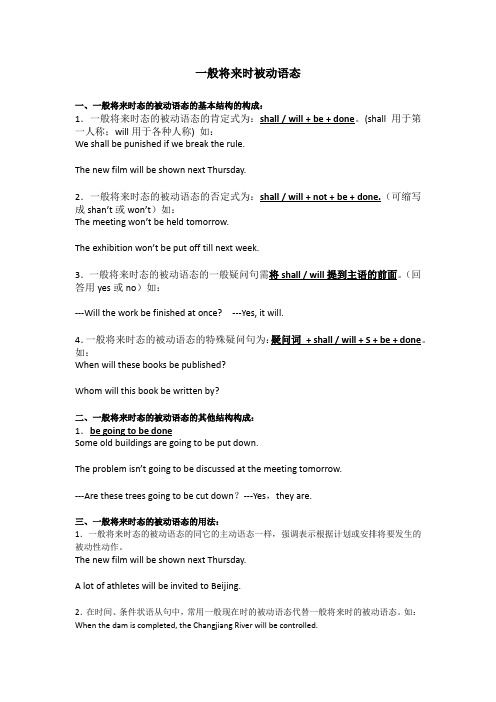
一般将来时被动语态一、一般将来时态的被动语态的基本结构的构成:1.一般将来时态的被动语态的肯定式为:shall / will + be + done。
(shall 用于第一人称;will用于各种人称) 如:We shall be punished if we break the rule.The new film will be shown next Thursday.2.一般将来时态的被动语态的否定式为:shall / will + not + be + done.(可缩写成shan’t或won’t)如:The meeting won’t be held tomorrow.The exhibition won’t be put off till next week.3.一般将来时态的被动语态的一般疑问句需将shall / will提到主语的前面。
(回答用yes或no)如:---Will the work be finished at once? ---Yes, it will.4.一般将来时态的被动语态的特殊疑问句为:疑问词+ shall / will + S + be + done。
如:When will these books be published?Whom will this book be written by?二、一般将来时态的被动语态的其他结构构成:1.be going to be doneSome old buildings are going to be put down.The problem isn’t going to be discussed at the meeting tomorrow.---Are these trees going to be cut down?---Yes,they are.三、一般将来时态的被动语态的用法:1.一般将来时态的被动语态的同它的主动语态一样,强调表示根据计划或安排将要发生的被动性动作。
英语时态要分别理解“时”与“态”,牢记四个要素时态不再丢分
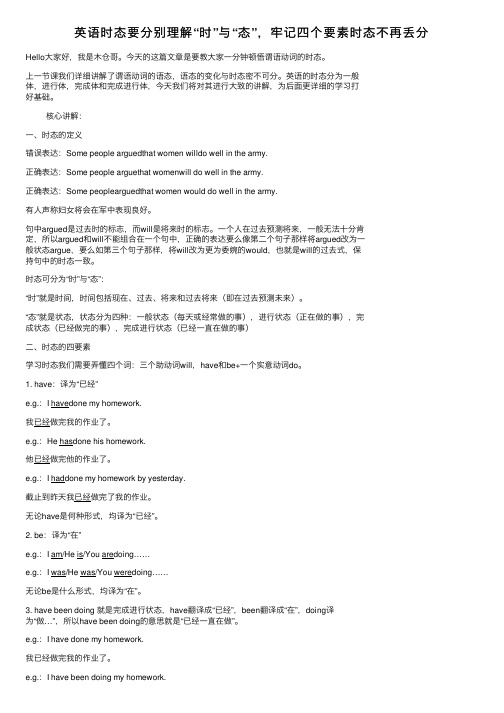
英语时态要分别理解“时”与“态”,牢记四个要素时态不再丢分Hello⼤家好,我是⽊仓哥。
今天的这篇⽂章是要教⼤家⼀分钟顿悟谓语动词的时态。
上⼀节课我们详细讲解了谓语动词的语态,语态的变化与时态密不可分。
英语的时态分为⼀般体,进⾏体,完成体和完成进⾏体,今天我们将对其进⾏⼤致的讲解,为后⾯更详细的学习打好基础。
核⼼讲解:⼀、时态的定义错误表达:Some people arguedthat women willdo well in the army.正确表达:Some people arguethat womenwill do well in the army.正确表达:Some peoplearguedthat women would do well in the army.有⼈声称妇⼥将会在军中表现良好。
句中argued是过去时的标志,⽽will是将来时的标志。
⼀个⼈在过去预测将来,⼀般⽆法⼗分肯定,所以argued和will不能组合在⼀个句中,正确的表达要么像第⼆个句⼦那样将argued改为⼀般状态argue,要么如第三个句⼦那样,将will改为更为委婉的would,也就是will的过去式,保持句中的时态⼀致。
时态可分为“时”与“态”:“时”就是时间,时间包括现在、过去、将来和过去将来(即在过去预测未来)。
“态”就是状态,状态分为四种:⼀般状态(每天或经常做的事),进⾏状态(正在做的事),完成状态(已经做完的事),完成进⾏状态(已经⼀直在做的事)⼆、时态的四要素学习时态我们需要弄懂四个词:三个助动词will,have和be+⼀个实意动词do。
1. have:译为“已经”e.g.:I havedone my homework.我已经做完我的作业了。
e.g.:He hasdone his homework.他已经做完他的作业了。
e.g.:I haddone my homework by yesterday.截⽌到昨天我已经做完了我的作业。
八种常见动词时态讲解

一、一般现在时
二、一般过去时
三、一般将来时 四、过去将来时 一般现在时 一般现在时 五、现在进行时 六、过去进行时 七、现在完成时 八、过去完成时
一、一般现在时
1.一般现在时的结构: 主语+动词原形+其它 I do my homework every day.
主语+am/is/are+其它
她说她打算买一辆小汽车。
I would do my homework.
1.改为一般疑问句并回答。 Would you do your homework? Yes, I would./No, I wouldn't. 2.改为否定句。 I wouldn't do my homework.
I was going to buy a car.
plan stop drop
study worry cry
planned stopped dropped
studied worried cried
2.一般过去时的用法:
1)表示过去某个时间所发生的动作或存在的状态 。常和表示过去的时间状语yesterday, last week, an hour ago, just now, in 1982等连用。在一般过 去时中,要表达“多少时间之后”,一般用 after。
用法:将来会出现或发生的动作 常用时间状语:this evening,tomorrow, next month, in a few minutes,at the end of this term 动词构成: I,will/shall+动原 2,am/is/are going to+动词原型 3,am/is/are(about)+动词不定式 4,am/is/are+coming等现在分词 否定构成:will/shall not… am/is/are not… 特殊疑问句举例:What will you do tomorrow? When are we going to have a class meeting?
英语时态讲解 清晰全面

英语时态时态是英语中一个重要的语法范畴,它表示不同时间发生的动作或存在的状态以及动作发生或存在的方式。
动作发生的时间可分为现在、过去、将来和过去将来四种形式,动作发生的方式可分为一般、完成、进行和完成进行四种形式。
将这时间形式和动作方式结合起来,就构成了以下16种时态形式(以do为例):等频度副词连用。
如:She is always complaining. 她总是在抱怨。
3)进行时表示按计划或已安排好要做的事这一用法只适用于某些动词,如:go,come,leave,start,arrive,return,spend,sail,meet,fly 等。
如:The guest is leaving by train tonight. 客人今晚坐火车走。
3. 现在完成时(have/ has done)用法:1) 表示动作到现在为止已经完成或刚刚完成。
I bought a new house, but I _________ (sell) my old one yet, so at the moment I have two houses.2) 表示发生在过去,但对现在仍有影响的动作或情况。
John has broken his left leg.(约翰摔断了左腿。
)3) 在"this is the first/ second/ third…… time that……"句型里要求用完成时。
This is the second time that the products of our company have been shown in the International Exhibition.(这是我公司产品第二次参加国际展览会。
)4) 句型"It is/ has been……since"所使用的两种时态都正确。
It is/ has been 10 years since I last saw him.(从我上次见到他以来已经10年了。
冀教版初中二年级英语语法第二讲:现在完成时态
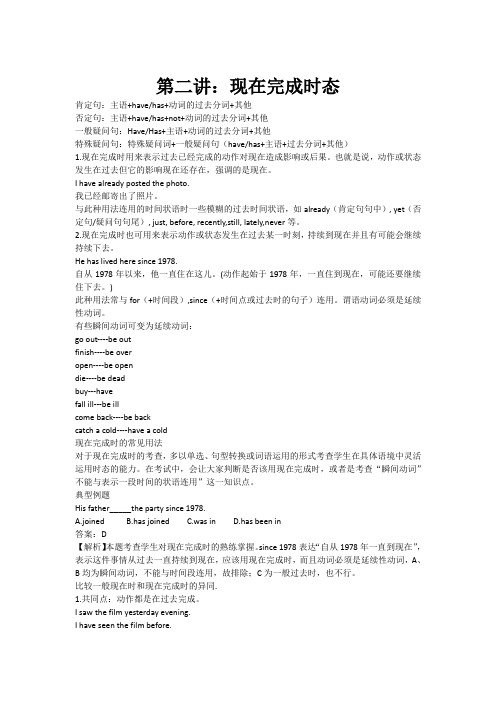
第二讲:现在完成时态肯定句:主语+have/has+动词的过去分词+其他否定句:主语+have/has+not+动词的过去分词+其他一般疑问句:Have/Has+主语+动词的过去分词+其他特殊疑问句:特殊疑问词+一般疑问句(have/has+主语+过去分词+其他)1.现在完成时用来表示过去已经完成的动作对现在造成影响或后果。
也就是说,动作或状态发生在过去但它的影响现在还存在,强调的是现在。
I have already posted the photo.我已经邮寄出了照片。
与此种用法连用的时间状语时一些模糊的过去时间状语,如already(肯定句句中), yet(否定句/疑问句句尾), just, before, recently,still, lately,never等。
2.现在完成时也可用来表示动作或状态发生在过去某一时刻,持续到现在并且有可能会继续持续下去。
He has lived here since 1978.自从1978年以来,他一直住在这儿。
(动作起始于1978年,一直住到现在,可能还要继续住下去。
)此种用法常与for(+时间段),since(+时间点或过去时的句子)连用。
谓语动词必须是延续性动词。
有些瞬间动词可变为延续动词:go out----be outfinish----be overopen----be opendie----be deadbuy---havefall ill---be illcome back----be backcatch a cold----have a cold现在完成时的常见用法对于现在完成时的考查,多以单选、句型转换或词语运用的形式考查学生在具体语境中灵活运用时态的能力。
在考试中,会让大家判断是否该用现在完成时,或者是考查“瞬间动词”不能与表示一段时间的状语连用”这一知识点。
典型例题His father_____the party since 1978.A.joinedB.has joinedC.was inD.has been in答案:D【解析】本题考查学生对现在完成时的熟练掌握。
2023年安徽省中考英语总复习一轮复习:第2讲-动词的时态和语态 (二)-教案
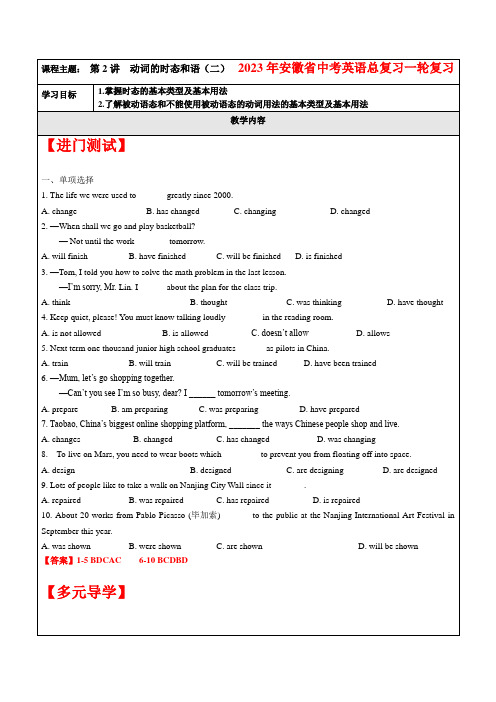
A. design
B. designed
C. are designing
D. are designed
9. Lots of people like to take a walk on Nanjing City Wall since it _______.
A. repaired
B. was repaired
-- He has gone to the supermarket. (3)have/ has been in:待在某地,住在某地。 例:I have been in Nanjing for three years.
2. for 和 since 的区别 (1)since 的用法 A. since 后可加时间点,如:It has been nine years since 1987. B. since 引导时间状语从句时,后面的时间状语从句动词用一般过去时,主句动词用现在完成时 (2) for 的用法:for 后加一段时间。如:They have worked in the factory for ten months . (3)since 和 for 用法的相互转换:for +一段时间= since+ 一段时间+ ago (4)对 since 和 for 的提问用 how long。如: —How long have you been in Nanjing?
1.表示经常性或习惯性发生的动作; 2.描述客观真理、客观存在或科学事实等; 3.在时间、条件状语从句中,用一般现在时表将
来。
be 动词的一般过去时 was/were+表语
1.表示过去存在的状态; 2.表示过去经常存在的状态。
行为动词及其他连系动
词的一般过去时
英语B级语法重点第二讲动词时态
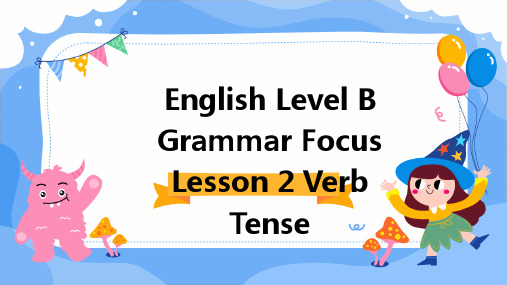
There are three main tensions in English grammar: present, past,
and future
Each main tense has several sub tensions, such as present simple, present continuous, past simple, past continuous, future simple, and
Correct use of tensions is critical for effective communication as it ensures that the listener or reader understands the timeline and sequence of events being described
Common Tense Miscellaneous and Correction
• One common mistake is using the present tense to describe past events or vice verse For example, saying "I go to the park yesterday" instead of "I want to the park yesterday."
The structure and usage of the present perfect continuous tense
Examples
I have been learning English for two years
牛津上海版初二初二下册英语第2讲-时态-教案

牛津上海版初二初二下册英语第2讲-时态(2)-1、上次课后巩固作业复习;2、互动探究教学建议:带领学生认真观看这四幅图,并引导学生摸索其中所用时态及其用法,以及比较其中的差异,从而引出本节课要复习的四个时态。
第一幅:过去完成时;第二幅:过去进行时;第三幅:现在完成时;第四幅:现在进行时。
He told me that he had made a serious mistake.When I got to the cinema, the film had been on for ten minutes.3. 过去完成时的时刻状语有:by +过去时刻点(eg. by 2021, by the time he was born) 等。
We had learned 2,000 English words by 2021.My older had worked as an engineer for 2 years by the time I was born.【例题精讲】例1.The bus had gone when I ________ at the bus stop.A.have arrivedB. arrivedC. had arrivedD. am arriving选B,依照句意应该是在我到达公交站之前公交车就走了,过去完成时应该是在一样过去时之前。
例2. Tom ________ of visiting his grandmother, but the bad weather made him change his mind.A. has thoughtB. thoughtC. had thoughtD. had been thought选C,依照句意应该是在Tom改变主义之前想要去拜望他的奶奶,在一样过去时之前应该是过去完成时。
例3.— Did you meet Tom at the airport?— No, he ________ by the time I ________ there.A. has left; gotB. had left; arrivedC. left; arrivedD. left; had got选B,依照句意应该是在我到那儿之前他就离开了,因此“我到达”是一样过去时而“他离开”是过去完成时。
时态讲解
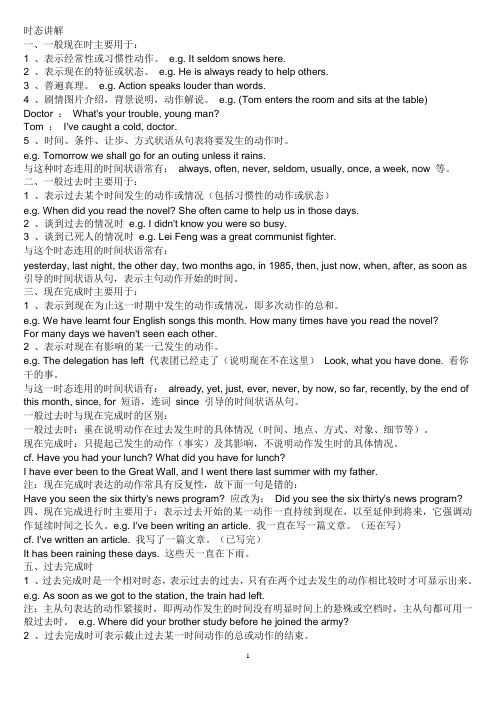
时态讲解一、一般现在时主要用于:1 、表示经常性或习惯性动作。
e.g. It seldom snows here.2 、表示现在的特征或状态。
e.g. He is always ready to help others.3 、普遍真理。
e.g. Action speaks louder than words.4 、剧情图片介绍,背景说明,动作解说。
e.g. (Tom enters the room and sits at the table)Doctor :What's your trouble, young man?Tom :I've caught a cold, doctor.5 、时间、条件、让步、方式状语从句表将要发生的动作时。
e.g. Tomorrow we shall go for an outing unless it rains.与这种时态连用的时间状语常有:always, often, never, seldom, usually, once, a week, now 等。
二、一般过去时主要用于:1 、表示过去某个时间发生的动作或情况(包括习惯性的动作或状态)e.g. When did you read the novel? She often came to help us in those days.2 、谈到过去的情况时e.g. I didn't know you were so busy.3 、谈到已死人的情况时e.g. Lei Feng was a great communist fighter.与这个时态连用的时间状语常有:yesterday, last night, the other day, two months ago, in 1985, then, just now, when, after, as soon as 引导的时间状语从句,表示主句动作开始的时间。
第2讲作业Lesson2Breakfastorlunch早餐还是午餐
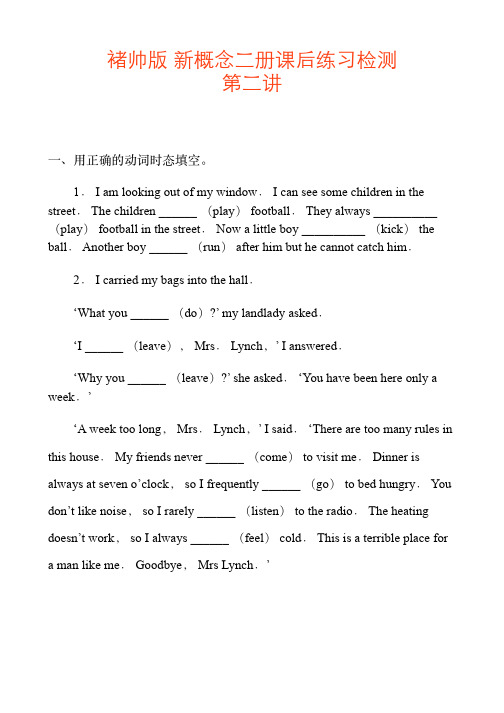
褚帅版新概念⼆二册课后练习检测第⼆二讲⼀一、⽤用正确的动词时态填空。
1. I am looking out of my window. I can see some children in the street. The children ______ (play) football. They always __________ (play) football in the street. Now a little boy __________ (kick) the ball. Another boy ______ (run) after him but he cannot catch him. 2. I carried my bags into the hall. ‘What you ______ (do)?’ my landlady asked. ‘I ______ (leave), Mrs. Lynch,’ I answered. ‘Why you ______ (leave)?’ she asked. ‘You have been here only a week.’ ‘A week too long, Mrs. Lynch,’ I said. ‘There are too many rules in this house. My friends never ______ (come) to visit me. Dinner is always at seven o’clock, so I frequently ______ (go) to bed hungry. You don’t like noise, so I rarely ______ (listen) to the radio. The heating doesn’t work, so I always ______ (feel) cold. This is a terrible place for a man like me. Goodbye, Mrs Lynch.’⼆二、改写下列句⼦子,把句尾括号中的词放在合适的位置。
第二讲-时态与句型

第二讲-时态与句型第二讲时态和句型(一)几个基本时态的概念、用法和考点一般现在时:用来表述真理、习惯、现在的状态和性质等,常与a l w a y s,u s u a l l y,o f t e n,f r e q u e n t l y,o c c a s i o n a l l y,s e l d o m,r a r e l y等频度副词或f r o m t i m e t o t i m e,a t a l l t i m e s等短语连用。
要点:频度副词的位置:S h e s e l d o m c o m e s h e r e.(行为动词之前)S h e i s a l w a y s l a t e.(b e动词之后)现在完成时:用来表述已经完成或部分完成的动作或状态,其特点是1)不出现动作发生的具体时间(一旦出现,就变成"过去时");2)常与"f o r"或"s i n c e"引导的时间状语(表示一个时间段,不是一个时间点)连用。
要点:"f o r"和"s i n c e"是现在完成时的标志词实例:______t h e e n d o f1999t h e o u t p u t o f t h e c o n s u m i n g p r o d u c t s i n S h a n g h a i h a s i n c r e a s e d b y o v e r30%.A.A tB.B yC.S i n c eD.A f t e r现在进行时:用来表述正在进行的行为,常与n o w,l o o k,l i s t e n等表示"现在"的词连用(注意:b e,k n o w,w a n t,b e l i e v e和部分半系动词一般没有进行时),如:L o o k,t h e s u n______b r i g h t l y i n t h e s k y.A.s h i n e sB.w a s s h i n i n gC.i s s h i n i n gD.h a s s h o w n现在完成进行时:用来表述说话时已完成部分内容,目前还在做的行为,其特点是除了"f o r"或"s i n c e"外,常出现a l l d a y,a l l t h e m o r n i n g等包括说话时间在内的时间状语连用,如"整个上午",说话时也是上午。
初中英语时态讲解(完整版)
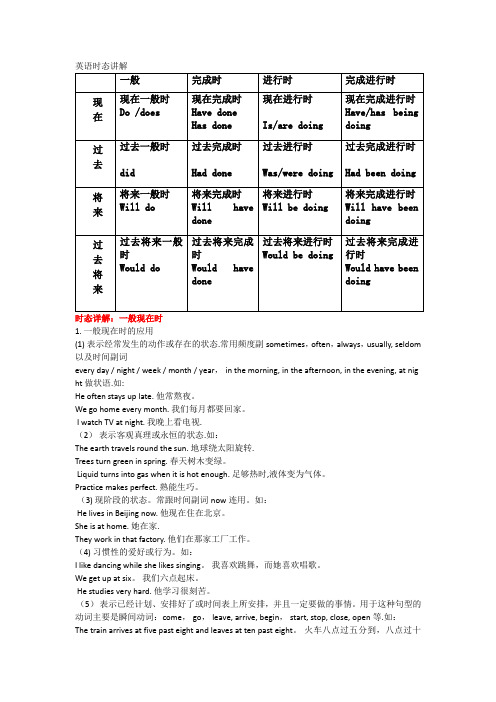
英语时态讲解1.一般现在时的应用(1)表示经常发生的动作或存在的状态.常用频度副sometimes,often,always,usually,seldom 以及时间副词every day/night/week/month/year,in the morning,in the afternoon,in the evening,at nig ht做状语.如:He often stays up late.他常熬夜。
We go home every month.我们每月都要回家。
I watch TV at night.我晚上看电视.(2)表示客观真理或永恒的状态.如:The earth travels round the sun.地球绕太阳旋转.Trees turn green in spring.春天树木变绿。
Liquid turns into gas when it is hot enough.足够热时,液体变为气体。
Practice makes perfect.熟能生巧。
(3)现阶段的状态。
常跟时间副词now连用。
如:He lives in Beijing now.他现在住在北京。
She is at home.她在家.They work in that factory.他们在那家工厂工作。
(4)习惯性的爱好或行为。
如:I like dancing while she likes singing。
我喜欢跳舞,而她喜欢唱歌。
We get up at six。
我们六点起床。
He studies very hard.他学习很刻苦。
(5)表示已经计划、安排好了或时间表上所安排,并且一定要做的事情。
用于这种句型的动词主要是瞬间动词:come,go,leave,arrive,begin,start,stop,close,open等.如:The train arrives at five past eight and leaves at ten past eight。
高中英语语法专题二: 英语时态语态专项讲解与练习 (含答案)
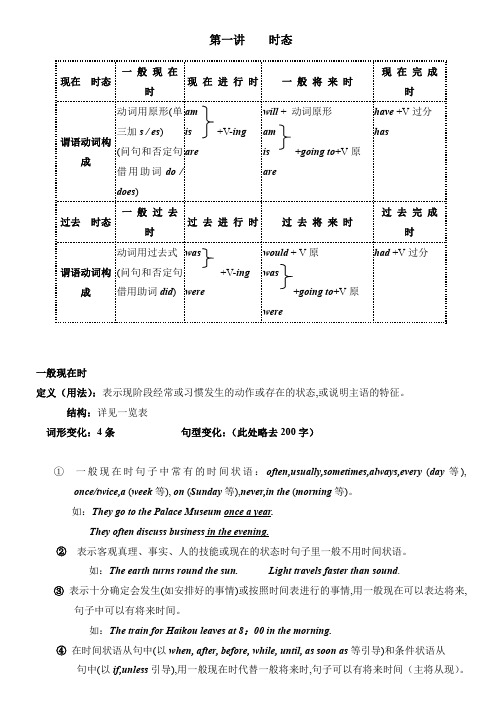
第一讲时态一般现在时定义(用法):表示现阶段经常或习惯发生的动作或存在的状态,或说明主语的特征。
结构:详见一览表词形变化:4条句型变化:(此处略去200字)①一般现在时句子中常有的时间状语:often,usually,sometimes,always,every(day等),once/twice,a(week等),on(Sunday等),never,in the(morning等)。
如:They go to the Palace Museum once a year.They often discuss business in the evening.②表示客观真理、事实、人的技能或现在的状态时句子里一般不用时间状语。
如:The earth turns round the sun.Light travels faster than sound.③表示十分确定会发生(如安排好的事情)或按照时间表进行的事情,用一般现在可以表达将来,句子中可以有将来时间。
如:The train for Haikou leaves at8:00in the morning.④在时间状语从句中(以when,after,before,while,until,as soon as等引导)和条件状语从句中(以if,unless引导),用一般现在时代替一般将来时,句子可以有将来时间(主将从现)。
如:Please ring me up as soon as you arrive in Germany.If it rains tomorrow,we will have to stay at home.一般过去时定义(用法)表示过去某时发生的动作或状态,这种动作或状态可能是一次性,也可能经常发生。
结构:详见一览表词形变化:(4条规则与不规则)句型变化:(此处略去200字)①表示过去具体时刻发生的一次性动作时,时间状语有:at(eight)(yesterdaymorning),(ten minutes)ago,when引导的时间状语从句。
- 1、下载文档前请自行甄别文档内容的完整性,平台不提供额外的编辑、内容补充、找答案等附加服务。
- 2、"仅部分预览"的文档,不可在线预览部分如存在完整性等问题,可反馈申请退款(可完整预览的文档不适用该条件!)。
- 3、如文档侵犯您的权益,请联系客服反馈,我们会尽快为您处理(人工客服工作时间:9:00-18:30)。
时态第二讲
五、现在完成时
助动词have+过去分词
基本用法
1.表示过去发生的某一动作对现在造成的影响或结果。
eg:I have just returned the book to the school library.
2.表示过去已经开始,持续到现在的动作或状态,往往和表示一段时间的状语的连用。
(since\for a long time\up to now 到现在为止)
eg:Mr Green hasn"t come to work since last week.
3.现在完成时可以与不确定的时间状语连用。
如:already,never,ever,just,yet,before,up to now,so far,in the last years等,表示到目前为止所发生的动作。
eg:She has just got a little headache.
4.还可以和包括和现在在内(到说话时仍未结束)的,表示一段时间的状语连用。
如:now,today,this morning,these day,since,for a long time等
eg:The nurse has taken my temperature now.
过去进行时
“were(was)+现在分词
用法
1.表示过去某一时刻或某一段时间正进行的动作(时间状语)
What were you doing at 8:00 yesterday evening.
\
2.表示按计划、安排在过去某时间将发生的动作。
eg:They were arriving in a few days.
注意:①过去进行时表示一个过去的动作发生时或者发生之后,另一个过去的动作正在进行。
也可用来表示过去一段时间内持续发生的动作。
eg:When I was reading the newspaper ,the light went out.
②还表示两个过去的动词作同时进行着,这时可用连接when或while引导。
eg:George was reading while his wife was listening to the radio.
③was going+不定时表示过去打算
eg:He was going to be a football player.
④过去进行时和一般过去时的区别
/ \
过去一段时间正在表示一个完成的
进行的动作动作
eg:I was writing letters last night.(可能没写完)
I wrote some etters last night.(已经写完了)
特殊的用法
1.由since引导的时间状语,它们的主句通常用完成时态。
It has been a long time since I saw you last.
2.只有在it is .....since.....这种结构中,主句的谓语可以用现在完成时,一般过去时,一般现在时。
eg:It is ten years since my dog was lost.
3.在句型:this is the first time (second time)..."中通常也用完成时态。
Is this the first time you have spoken english?
4.短暂性的动词不能与表示一段时间的状语连用
(appear,begin,borrow,buy,close,come,die,fall,find,finish,join,kill,leave.lend, lose,sell,start,stop等)
He joined in league three years ago.
He joined in league for three years.(他于3年前入团)
5.非持续性的动词的否定形式可以表示状态的延续,可与for,since时间状语连用。
I haven't seen a film for a long time.
6.有些时间状语,如:this morning(afternoon),tonight,this May等,既能用于现在完成时,又能用于一般过去时,但意义有所不同。
I have not been free this morning.(说话时在上午)
I was not free this morning.(说话时是在下午或晚上)
7.have(has) been和have(has) gone的区别
Have been to a place:“到过,去过”,表示曾到过某处,但现在人不在那儿(到目前为止的一个结果);
have gone to :“去了”,表示已经去了某地,现在可能人可能在去的途中或已在那儿了(只能于第三人陈)
Has your mother ever been to Paris?
She has gone to Hainan.。
